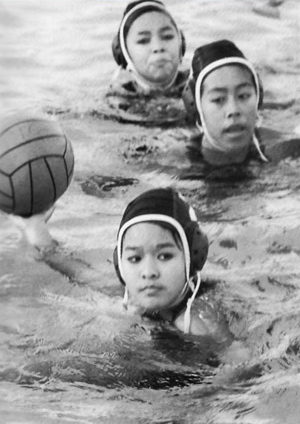Rough waters
I was ecstatic when I joined the water polo team sophomore year. After every practice I took notes in a notebook on what I needed to improve, like a swimming technique or ball-handling skills. I even read the USA Water Polo magazine every month.
But there was one problem … I was a terrible swimmer. I was afraid of water and could barely swim 10 feet. I took swimming lessons when I was 11, but I had forgotten almost everything. I couldn’t even tread water. This was important because in water polo you’re not allowed to touch the walls or the bottom of the pool.
I had joined because whenever my friends on the team talked about playing water polo, it sounded so fun and exciting. But playing water polo without knowing how to swim well was hard.
I made the team only because the girls team didn’t have enough players. My water polo friends told me that they would teach me to swim better and teach me the rules and how the game was played. I thought that my swimming would improve quickly because I was dedicated to working hard. My goal wasn’t to become one of the best players, just not to be one of the worst.
When the season started, I was the worst player by far, so I was put on the junior varsity team. At first all I did during practice was work on treading water, while everyone else was running the regular drills in the pool. I didn’t even want to go to the deep end of the pool because I would sink unless I grabbed the wall. After three days I learned to tread water but I still wasn’t good.
I didn’t know how to play the game
Water polo became more complicated after that, because then I had to learn the rules and tactics. The coaches used confusing terminology, like weak side or driving, that I didn’t understand. I would tap a person next to me and have them explain what the coach meant. I learned that weak side meant the side without the ball, while driving meant moving toward the goal to shoot or receive a ball.
Water polo players are supposed to play both defense and offense. But I couldn’t swim fast enough to the other end of the pool, so the coaches told me to “stay on defense.” It was embarrassing to have everyone stare at me while I treaded water alone. During games, I was lucky to even touch the ball. I felt like a loser but my coach encouraged me, saying that I was still learning.
I was frustrated that I couldn’t do my part for my teammates who always encouraged me even when I made embarrassing mistakes. One time they passed me the ball (this was a big deal because they never passed me the ball) but I lost it to the other team. During another game, I ended up on the wrong side of the pool. The rest of my team was setting up after the other team scored but I didn’t notice because they were all behind me. The other team’s goalie kindly pointed it out and I had to swim back.
After a while, I accepted that I wouldn’t improve as much as I had hoped in the beginning.
When I finally improved my swimming enough to play offense, I still struggled. Sometimes I managed to make good passes, but other times I freaked out when I had the ball and usually lost it.
At the end of the season, I managed to make a few attempts at the goal because the coaches set up plays so that I could score. It felt fake to me, even though my teammates told me that they did that every year. The first game they did this, my shot didn’t go near the goal, but during the last game, I made three attempts and the ball almost went in. A lot of my teammates congratulated me, even though I didn’t score. But by then I couldn’t care less about scoring. I was just happy that I could play and wasn’t alone treading water on defense.
Hanging out with my teammates was the best part
Even though we didn’t have a winning season, I enjoyed the year because we had a lot of fun. My coach put an emphasis on closeness, so we often had team bonding days where we went hiking or had a team dinner. On Fridays we went to our school’s boys basketball games or played board games with the coaches. Out of the pool, we were all on the same level and just had fun.
Water polo season ended, and at the banquet my teammates voted me “Most Improved.” Before giving me my plaque, one of the coaches recalled how I used to be afraid to swim in the deep end, but how by the end of the season I could swim and play. It made me feel thankful because I wouldn’t have improved as much without them.
As much as I loved water polo, I decided not to play this year so I could focus on my grades. It hurt to leave my teammates. I still cheer for them at games. Watching them makes me want to join them, but I know I have to put school first.
Water polo gave me a better understanding of myself because I had set my expectations too high. I learned that working hard isn’t always enough. But I’m proud that I kept trying to improve even though I wasn’t very good.







